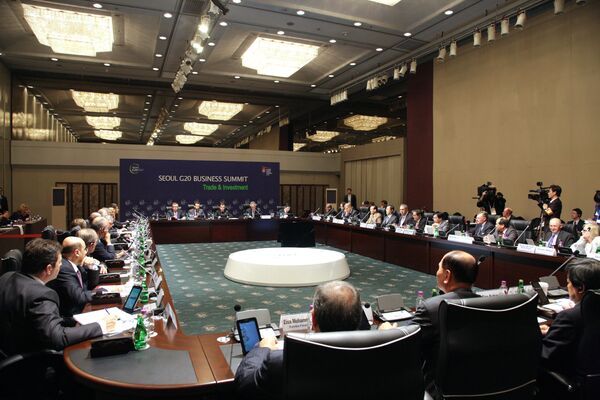Ending currency wars, the competitive devaluation of national currencies, has become the focal point of the G20 summit that opened in Seoul today. Jose Manuel Barroso, president of the European Commission, said at the opening of the summit: "Nobody should seek growth for its own sake at the expense of others. This would lead to a race to the bottom. The task of the G20 is to avoid that from happening." However, judging by the demarches of some members, the conflict is unlikely to be settled quickly.
The lower, the better?
Currency wars broke out in the fall of this year, when many countries - from the United States and Brazil to South Korea and Thailand - started artificially devaluing their currencies to make their exports more competitive and to attract investors with cheaper assets. They resorted both to direct interventions on the currency market and indirect measures, such as pumping liquidity into their national economies. For example, the U.S. Federal Reserve recently announced plans to purchase $600 billion worth of government bonds within eight months, which is tantamount to simply printing money.
Efforts to end the currency wars have not yet produced results. In late October, G20 finance ministers agreed to abstain from devaluing currencies and promised to transition to market-based exchange rates. However, countries with reserve currencies have not pursued a coordinated monetary policy.
If they had, the United States would not be able to inject $600 billion into its economy.
With their actions, the key players in the world economy have indicated that it's every country for itself. For years, America has demanded that China let its currency appreciate, as a weak yuan gives Chinese exporters an unfair competitive advantage. U.S. Treasury Secretary Timothy Geithner repeated today that China cannot continue to resist the upward market pressure on the yuan without facing higher inflation. Secretary Geithner apparently sees no contradiction in criticizing China for keeping the yuan artificially low while the Federal Reserve pursues the exact same policy.
Solving the unsolvable
Everyone is talking about the need to end currency wars, but nobody is taking action.
Today's currency wars have been decades in the making. Toward the end of the 20th century, American and European companies started moving their plants and factories to Southeast Asia and later to China in order to cut production costs. This policy allowed the West to temporarily avoid many economic, social and environmental problems.
Now companies that kept their production facilities in Europe and the United States are being clobbered by cheap imports from Asia. This is to be expected, as American workers earn five to ten times more than Chinese workers. But the problems don't stop there. It turns out that revenues from the sale of services and intellectual property, the West's main exports, are far below the money Western nations spend on industrial goods imported from the East. As a result, the U.S. has a trade deficit of 3.3% of GDP, while China has a trade surplus of 4.7% of GDP.
There are still no solutions to the systemic problems plaguing the global economy. Instead formal steps are being taken to redistribute the roles in international organizations. The few agreements reached before the G20 summit increased the representation of developing nations in the International Monetary Fund (IMF). Its Board of Governors will continue to have 24 seats, but two of the seats will be given to developing countries at the expense of the European Union.
This move will probably make it easier for developing countries to receive IFM loans. However, this will unlikely consolidate their position in the global economic system.
When the G20 was taking shape, many experts predicted that it would weaken the role of the IMF and World Bank as regulators of the global economy. Indeed, the real solutions to pressing issues like currency wars will be hammered out by representatives of the world's leading economies at bilateral negotiations held on the sidelines of the summit in Seoul.
The views expressed in this article are the author's and do not necessarily represent those of RIA Novosti.

